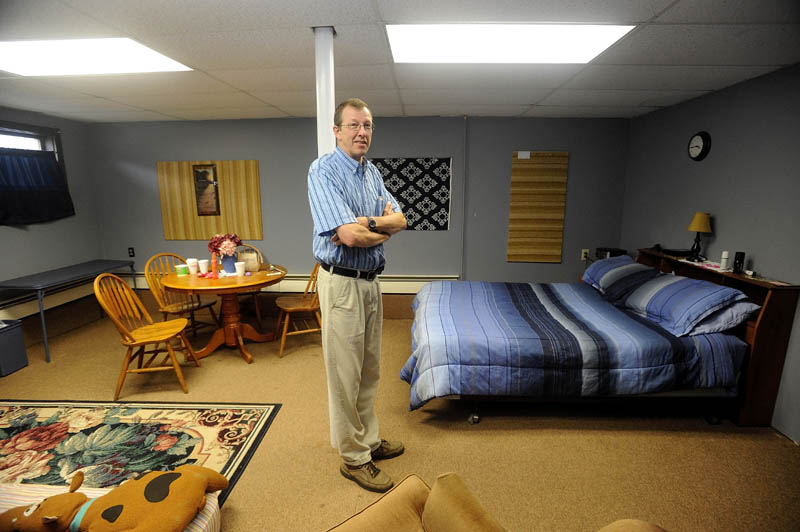FARMINGTON — You can’t always tell there are homeless people in a rural Maine town. They aren’t panhandling or sleeping on street corners — they fit into the scenery, often staying with friends, in cars or camping.
But across Franklin County, there is a growing population of homeless residents, sleeping on couches or living in tents, according to a group of area residents.
The group of organizers representing local social service agencies and churches have joined together to form Western Maine Homeless Outreach and are preparing to open the county’s first homeless shelter in October.
Organizers said the shelter is overdue in the county, which has few ways to help local people in need of emergency housing.
The homeless shelter, to be built in the basement of Farmington’s Living Waters Assembly of God Church, will be one of 44 shelters in Maine.
According to the Maine State Housing Authority annual “point-in-time survey,” there were 1,175 homeless people in Maine on Jan. 30, the day of the survey.
The Rev. Steve Bracy said his Wilton Road church volunteered to host of the shelter on a temporary basis until there is money to build a free-standing shelter.
He said in the past the church tried to open a homeless shelter for teenagers, but the project lacked community support and eventually lost momentum.
That has changed this time, he said.
Organizers have been meeting once a week for the past two months and he said residents have been contacting him about ways to donate.
The shelter will eventually have 20 to 24 beds and house area families. Bracy said they don’t have the resources to set up space for singles, and they will still have to refer single people to shelters in other areas.
People call him two or three times a week, asking for emergency housing, he said. The church has been able to house an adult or adult and child in the church basement in a motel-style room originally intended for visiting pastors or missionaries.
The church, however, does not have the resources to help many people and it often needs to refer people to other agencies or shelters.
Organizers said one of the problems they have to overcome is one of awareness. In Franklin County, the homelessness are not panhandlers and scruffy people with cardboard signs reading “will work for food.”
Bonita Tompkins, finance and administration director at United Way, said there is little awareness in the area about the expanse of the problem in Franklin County.
“People have a general concept that there is no homelessness in this area,” she said.
She said in the three months she has worked at the Farmington-based United Way, the majority of phone calls she answers are people looking for housing assistance, and there is little she can do for them.
Tompkins said the people she’s met who are homeless are instead often couch surfing with friends, living in cars or sleeping in tents in the parks and woods.
Tompkins gets increasingly energetic and passionate as she talks about the future shelter, and said she “honestly almost teared up” when Bracy showed her and the other organizers the Living Waters basement at 547 Wilton Road.
For now, the basement is need of remodeling and construction, Bracy said. The kitchen to-be is a bare floor and mismatched tables and chairs. The side rooms, which will hold the bunk beds and serve as the sleeping area, are still Sunday school rooms and storage.
But Tompkins said she saw the amount of space and could picture the shelter.
“We just knew it was where we belonged,” she said.
Lisa Laflin, executive director of the United Way of the Tri-Valley area, said the definition of “homeless” is evolving, but for now, living in a car or on a neighbor’s couch is not considered homeless for the purpose of government grants for shelters.
“It’s a challenge for rural Maine. We’ve always had a challenging time showing there is a big homeless population in Franklin County,” she said.
It’s important to be able to document the number of people who are homeless, Laflin said, because those numbers enable the group to get federal and state funding.
She said homelessness is traditionally tracked by the amount of people spending the night at a shelter. Because they do not have a shelter already in place, Laflin said, it is difficult to get numbers for grants applications.
She said while housing is a major aspect of the project, the organizers plan to not only provide temporary housing, but to connect the people with resources to treat what is contributing to their homelessness.
“There’s often much more to the story than was is immediately presented,” she said.
Kaitlin Schroeder — 861-9252
kschroeder@mainetoday.com
Send questions/comments to the editors.


